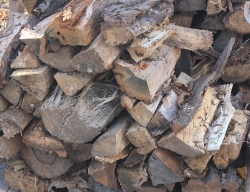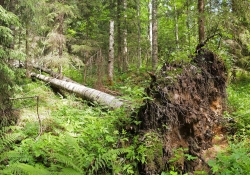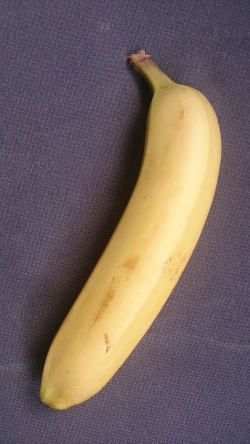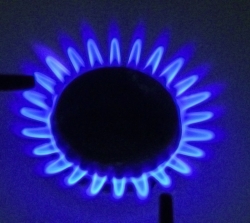Let's go back in time. Let's go back before there were houses with nice fireplaces. Back before there were vents to warm the room. Let's go back before there were cars with heaters and back before stoves. Let's go all the way back to when humans were first wandering the Earth. We arrive right in the middle of winter. There's a blizzard. Snowflakes swirl through the air. Brrr. How are we going to get warm? Where does heat come from?

OK, who turned off the heater?
If we were in the present, we could flip a switch to burn gas and make heat. We could microwave some hot chocolate to warm the stomach. In the past, we do not have these things.
Fuel is something that can be used to give off energy. Food is fuel that lets living things run and work. Gas is fuel that lets cars drive. In the past, where are we going to find our energy? What is fuel for fire? Ah, here's some dry wood. Now what?

This will keep me warm for the winter.
Yinan Chen, Public Domain, via Wikimedia Commons
Everything has energy in it. Trees, chairs, animals, rocks, you. They take it in from the sun or from something else that has stored energy. Not everything has energy for everything else. People can only use food for fuel. Cars can only use gas. Fire can use almost anything, but wood is the best. To
contain means to have something inside. We eat food to get the energy that's inside of it. Dry wood contains energy from the sun. The tree used this energy to grow before it died and we found it on the ground. How do we get this energy out now?

If I wait long enough this tree will turn into coal.
Tiia Monto, CC BY-SA 3.0 , via Wikimedia Commons
I cheated a little bit. I brought a banana to the past. I did not want you to have to kill something to eat. We are scientists and we are here to study, not hunt. You eat this banana while we figure out how to get the energy out of this dry wood. By rubbing these two sticks together and blowing, we may be able to create a little heat and start this fire. Rub rub rub, whhhoooooo. Rub rub rub, wwhhhooooo. Once you start to sweat, there it is! A little spark grows into a little flame, which grows into a roaring fire! The fire is now using up the wood to make more fire. To
consume means to use up. When we use a fuel to get energy, we can say that we consumed the fuel. When your car uses gas to move or you eat food to live you are using it up. But wait, is it gone once it's used up? No! The fuel just changed to heat and light.

Who doesn't love bananas?
ProjectManhattan, CC0, via Wikimedia Commons
I hope you are not too tired to wipe the sweat off your forehead. When fuel is used up, it changes. Wood turns into fire. Gas fumes are lit and they push the small parts that make a car engine run. Food turns into energy that helps a person move. When this change happens, things heat up. Why is that? Whenever anything uses up fuel, it does not do a great job. That's why you sweat when you work out. As your body uses the food you ate, it gets super hot. A lot of the food is wasted. One banana does not equal one banana's worth of work. One stick does not equal one stick's worth of fire. When something is
released it is let out. Anytime fuel is used, it releases heat. Put your hand a few feet above the fire. Feel that? Now put your hand up to your head. Some of the banana you ate is being let out as heat. Heat is what is lost when we change fuel into energy we can use. What a waste, right? . . . No! You are warm now!

Now we're cooking with gas.
George Shuklin, Public domain, via Wikimedia Commons
The past does not feel so freezing cold now. Being in the middle of winter a long time ago is not so bad as long as you remember where heat comes from. If you have fuel, it contains energy. If you consume that fuel, as a banana or as wood in a fire, then you can release heat as waste. Then you will feel nice and warm. Are you ready to go back to our time now? Are you sure? Even if I cheated twice and brought marshmallows?
References:BrainPop Educators. "Heat" Brain Pop, Jr., 2011. <
http://www.brainpopjr.com/science/energy/heat/grownups.weml>
Tiki the Penguin. "Energy:
What are fuels? How do you get energy from them?" One World,
2009. <http://tiki.oneworld.net/energy/energy3.html>
The Telegraph. "QI: Quite Interesting Facts About Heat" The Telegraph, 2011. <
http://www.telegraph.co.uk/culture/qi/8271418/QI-Quite-interesting-facts-about-the-heat.html>